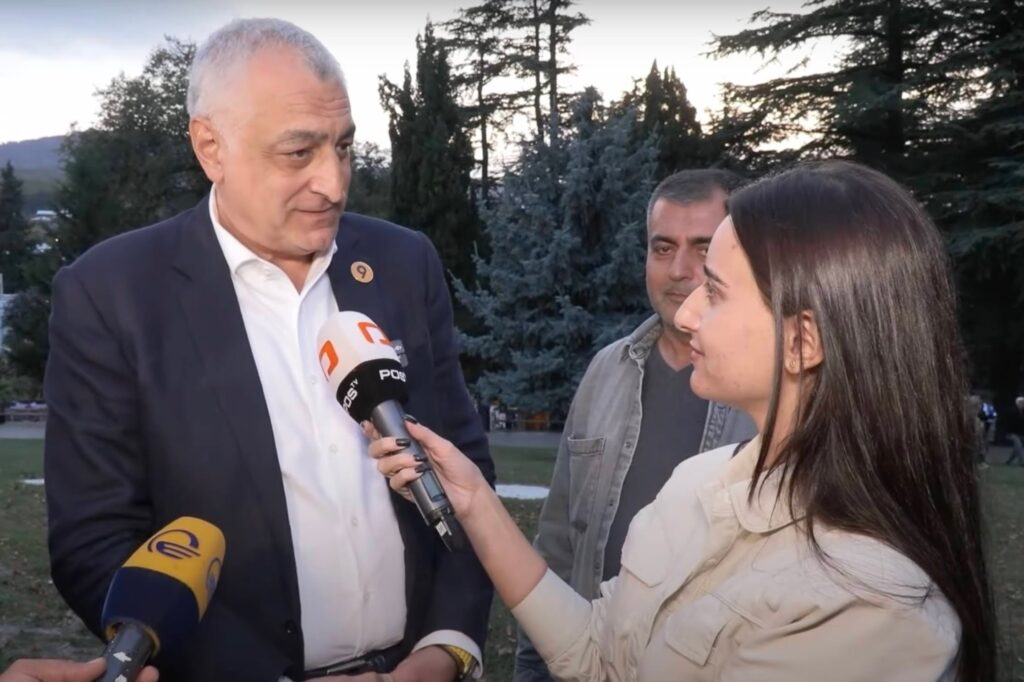Pro-government TV channel POSTV has launched a series of Armenophobic attacks against the chair of the Lelo party and leading figure in the broader Strong Georgia opposition alliance, Mamuka Khazaradze.
On 11 October, POSTV released a video showing an unnamed reporter pressing Khazaradze with accusations that he was concealing his supposed Armenian heritage.
The on-the-spot interview was evidently recorded on 10 October, when Khazaradze and Strong Georgia were holding a campaign event in Telavi, a town in eastern Georgia.
‘Why are you hiding your [ethnic] descent? […] We know that you have Armenian roots. Are you ashamed to admit this?’, the reporter asked.
In the segment aired by POSTV, Khazaradze, who appeared to be taken aback, denied having Armenian roots, and challenged the reporter to provide proof. Later, he responded with a comeback, asking: ‘Do you happen to be Thai?’.
At one point, the reporter warned Khazaradze that she had ‘evidence’ and would show it to him.
Hours after the segment aired, Multinational Georgia, a local minority rights group, condemned it as ‘discriminatory’ and ‘rooted in a stereotypical (in this case, Armenophobic) attitude ingrained in society’.
In a statement on Facebook, the group included an image of a silhouette resembling a prehistoric or Neanderthal-like figure holding a spear, seemingly as a commentary on the nature of the attitudes displayed by the pro-government station.
Multinational Georgia also appealed to the Charter of Journalistic Ethics over POSTV’s violation of the Charter’s seventh principle against ‘promoting discrimination through the media’.
The Charter is a self-regulatory body for journalists in Georgia designed to uphold ethical standards in journalism with an emphasis on self-regulation rather than government intervention in media practices. Its seventh principle calls on journalists to ‘recognise the risk of promoting discrimination through the media’.
While the Charter has yet to make a ruling on the segment, Georgian Public Defender Levan Ioseliani swiftly reacted to it on his Facebook page on 11 October, noting that ‘although asking questions is the primary role of the media, it should not assume a discriminatory tone’.
Both in the questions posed to Khazaradze and in the video caption shared online, POSTV attempted to preempt accusations of discriminatory questioning by stating that Armenians were ‘the best people,’ with whom ‘Georgians shared centuries-old brotherhood and history’, while the ‘Armenians of Tbilisi were an integral part of the city’s unique character’.
The TV station did not clarify why the opposition leader’s ethnic background was of relevance to voters, who are preparing to cast their votes on 26 October.
POSTV serves as a mouthpiece for People’s Power, a group that formally split from the ruling party but continues to form a parliamentary majority with Georgian Dream. The two groups are currently running for re-election together.
Zurab Kadagidze, a former Tbilisi City councillor from Georgian Dream and a member of the municipal assembly’s human rights and civil integration commission, and Tamta Megrelishvili, another member of People’s Power, both shared POSTV’s video. In their Facebook posts accompanying the video, they accused Khazaradze of being ashamed of his ethnic Armenian background, a claim framed as offensive and targeting Khazaradze’s refusal to acknowledge his ancestry publicly.
Although it was the 11 October video that captured public attention, Khazaradze had been subjected to Armenophobic attacks in the weeks prior. On 1 October, POSTV posted a video dedicated to him entitled ‘Khazaradze’s Armenian Shalakho’. Shalakho is a traditional Caucasian folk dance particularly popular among Armenians and Georgians.
POSTV has continued those attacks since. On 13 October, the channel published an interview with a man they identified as Aslan Mkrtchyan based in Yerevan, whom they cited as saying that Khazaradze was a distant relative who had refused to help him financially.
‘He probably spent a lot of money on PR, but gradually we found out that he is a usurer, a schemer, a fraudster, and a liar. But that’s not all. It has now also emerged that he is hiding his own ancestry’, POSTV’s latest video published on 13 October claimed, before reporting another claim about Khazaradze’s ethnic background.
Common anti-Armenian stereotypes in Georgia often portray Armenians as greedy or deceitful, while accusations of concealing one’s Armenian heritage have frequently been used against public figures, including politicians.
High profile politicians previously accused of being Armenian have included former President Mikheil Saakashvili and former Parliamentary Speaker Nino Burjanadze.
[Read more: Armenophobia: ‘the oldest form of xenophobia in Georgia’]




 14 October 2024
14 October 2024



